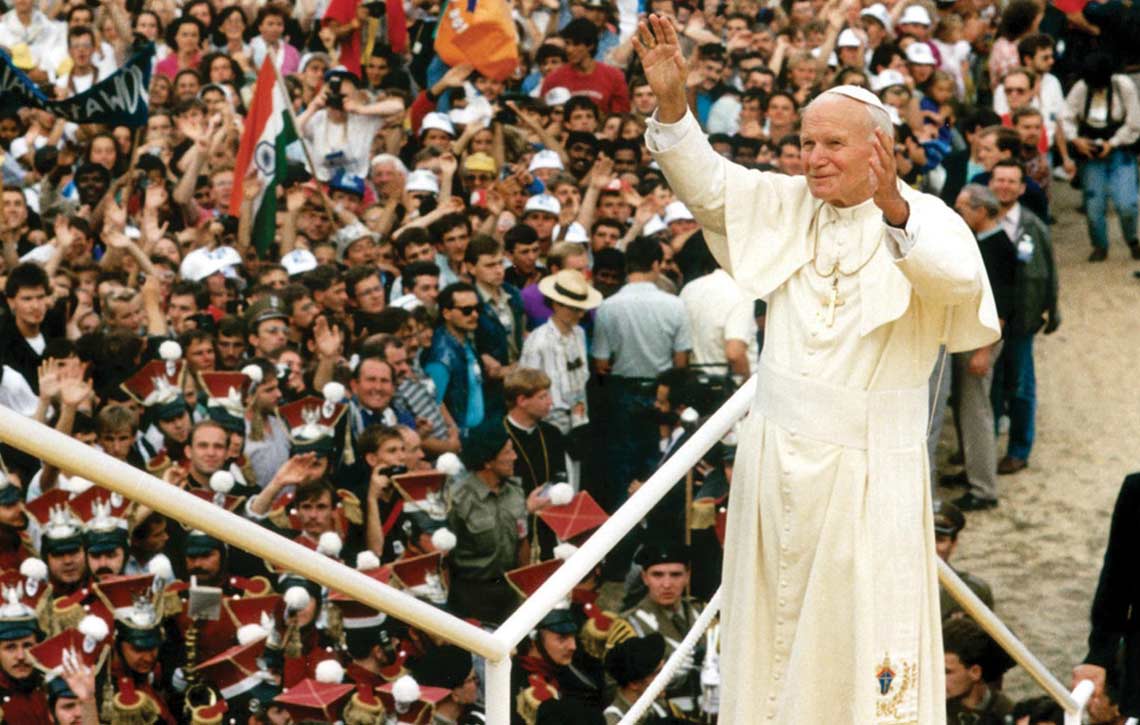In the picture
"HUMAN RIGHTS FLOW FROM THE DIGNITY OF HUMAN NATURE AND ARE OBJECTIVELY TRUE, SO THAT THEIR EXISTENCE DOES NOT DEPEND ON THE WILL OF THE PUBLIC AUTHORITIES".
John Paul II built his juridical thought on the profound conviction that the justice to which law aspires, the dignity which law justifies, the freedom which law protects, the truth which law upholds and the good which law procures constitute one and the same reality and are therefore completely interdependent. He arrived at this profound conviction from his Christocentric vision, which allowed him to distinguish, but at the same time integrate, divine law and human law, natural law and positive law, justice and love, private good and public good, patriotism and cosmopolitanism, family and state, freedom and order, individual conscience and objective truth, or private property and the universal destination of goods.
From his Christian humanism, John Paul II understood law as a necessary ethical component in his project to revivify and renew the world of culture and social justice in Christ, placing faith at the service of reason and reason at the service of faith. He saw law as an indispensable social instrument for achieving peace and harmony among peoples. With his Christian humanism, Wojtyla shook the foundations of the oppressive communist system in his beloved Poland and Eastern Europe, which collapsed during the first half of his pontificate. Today, all experts recognise the important role he played in the fall of the Berlin Wall and the Iron Curtain.
John Paul II approached law from philosophy, ethics and theology, but also as a statesman, world leader and pastor of the Catholic Church. He was not only a theoretician of law, but also created and applied it as pastor of the Catholic Church and head of the Vatican State. Through his public actions, he helped Eastern Europe and especially his beloved Poland to substantially transform their legal systems.
John Paul II grasped the importance of law for the establishment of a culture of love, which was the aim of his pontificate. Without law there is no justice, and without justice there is no love. At the centre of the juridical order, John Paul II placed the human person, whose dignity flows from being created in the image of God.
When dignity ceases to have its origin in God, it is easy for the orders to place the focus of attention on a falsely divinised man, no longer as a child of God, but as master and lord of himself, ethically independent of any divine mandate. For John Paul II, solidarity is the principle that sample the way people act confirms their dignity. From the dignity of human nature flow human rights, which are objectively true, so that their existence does not depend on the will of the public authorities.
Finally, John Paul II was a great reformer of canon law. To him we owe, among other legal texts, the promulgation of the 1983 Code of Canon Law, the 1990 Code of Canons of the Eastern Churches and the 1988 Apostolic Constitution Pastor Bonus on the reform of the organisation and government of the Roman Curia.
